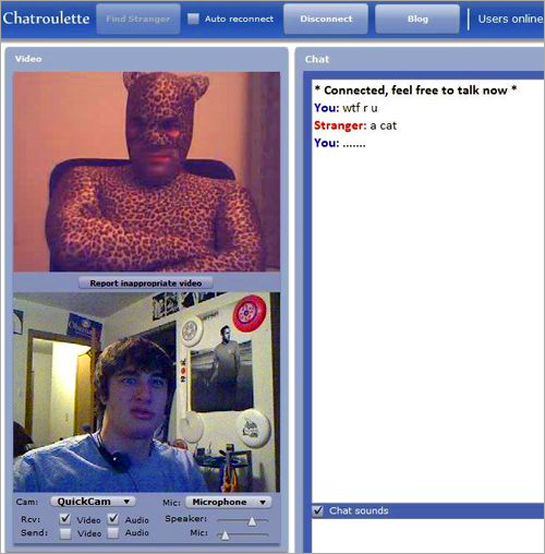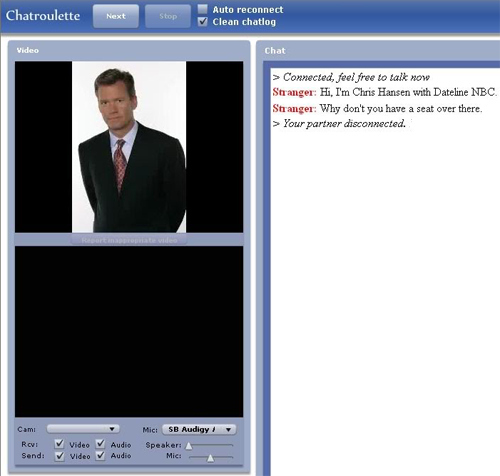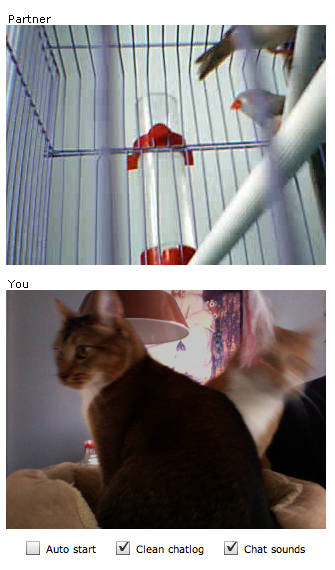How Chatroulette Taught Me Everything I Need to Know About the Internet
Tama Leaver / Curtin University of Technology

Genetic scientists love the humble Fruit Fly (Drosophila melanogaster) because it has such a short life-cycle; several generations can live, reproduce, pass on genetic material, and die within a month. In this column, I’d like to suggest that Chatroulette is the current fruit fly of the internet, by which I mean, Chatroulette, its users, and the responses to it, evoke many of the big issues facing internet users today, and do so in a far faster and more immediate way than on the internet at large. On the off chance you’re unfamiliar, Chatroulette does exactly what the name implies: the website randomly connects two users with webcams and chat functionality; there are no log-ins, no registration pages and very few rules, none of which appear to be enforced.1 Notably, Chatroulette was created by Andrey Ternovskiy, a 17 year old Russian student who, legally, would be considered a child himself in many countries. With that context in mind, I want to address Chatroulette in terms of search, ‘Sex!’, privacy, copyright and creativity.
Search (spelled F9)
Yes, Chatroulette has the slowest ‘search’ out there today, but despite its rudimentary design, search is still one of the key drivers behind Chatroulette’s success. It is social search, not in the sense Google means, which is web search refined by your clearly articulated online social networks, but rather social search in the sense that Chatroulette users are continually searching until they find someone with whom they want to interact socially. Chatroulette presents a smorgasbord of the human condition, with shocks, cocks, hugs, and friends all potentially staring back from your computer screen. Judicious application of the F9 or ‘Next’ button means many users spend more time searching than socialising, more time hunting than chatting, but that’s part of the joy: most Chatroulette users don’t know what they’re searching for until they find it. In that sense, Chatroulette’s search is the anti-Google; it’s a social search engine which only works if you can’t already articulate what you’re looking for.
chat roulette from Casey Neistat on Vimeo.
Sex!
According to much of the mainstream media, you don’t find sex on the internet, you find ‘Sex!’ with that magical exclamation mark which transforms three letters into ten, spelling out sensationalist gold in its most popular form: moral panic. Case in point, Fox News’ Joshua Rhett Miller reports that ‘Chatroulette Is ‘Predator’s Paradise,’ Experts Say’ while Sam Jones of the more respectable Guardian poses the question ‘Chatroulette: risque chat service or pornographic site?’ While these reports are not without some grounds – there do appear to be a lot of Chatroulette users who are unlikely to be legal adults, and there is certainly an annoyingly high percentage of faceless men masturbating on camera – this problem is neither new nor in any way unique to Chatroulette. While the potential to see such content is certainly a clear reason for some people to avoid the website altogether, the fact that these issues are indicative of online culture can also serve as a reminder that teaching young adults, and older ones, strategies for dealing with unwanted material can be vitally important. For some, the risk isn’t worth the visit, but for others the richness of random connectivity can be enjoyed with a keen sense of when to look away, when to engage, and when that F9 key will save your sanity. Social media researcher danah boyd expressed this far better when she said:
“I realize that this creates the potential for seeing some pretty gross and/or problematic things and I certainly don’t want to dismiss that, but I’m pretty certain that teens are responding the same way that I’m responding – by clicking Next. Is that ideal? Probably not.”2
Ideal or otherwise, it’s a sensible strategy for most Chatroulette users. On the moral panic front, sometimes the only way to contextualise the excesses of the media is to take those excesses to their logical extreme, which is where Jon Stewart’s team on The Daily Show excel.
Privacy
Despite the notion that Chatroulette is anonymous, like most moments online when people presume their identity is shielded, this ends up being far from guaranteed. The clearest illustration of just how private Chatroulette isn’t comes from a very quick glance at the Chatroulette Map. This mash-up uses screenshots and the IP addresses of Chatroulette users to extract geographic locations and place them on a Google Maps-powered globe. The map only features a tiny percentage of users, and is only updated periodically, but as their FAQ points out, anyone with a little technical know-how can easily extract this information. Indeed, far from sinister, the creators of the Chatroulette Map clearly have their own notion of privacy they’re trying to respect, as they currently display this notice on their landing page:
“We’d like to advise maine.edu to stop using student’s names in their hostnames. We’ve decided, at least for the time being, to hide IP & host information as some user-identifiable information was found in some entries.”
What the Chatroulette map clearly flags is that in online contexts, notions of privacy and anonymity are slippery at best. While it was a little worrying to hear Google CEO Eric Schmidt being so flippant about it, his general point that we should never presume anything done online is entirely private or anonymous is good general advice.

Copyright and Creativity
Copyright and creativity online are a bit like a perpetual motion machine; their simultaneous opposition and mutual reliance drives so much of the content which appears (and disappears) online. Chatroulette is clearly a creativity engine; a rudimentary YouTube search returns almost 4,000 videos with Chatroulette in the title or tags, and while some are mean and banal (such as a fake hanging video) other videos are actually quite creative (including the saccharine but feel good ‘Hearts, Hugs & Kisses on ChatRoulette :)’). More explicitly commercial interests have already started to experiment with Chatroulette, too, with indie band Nurses using the service to record a music video for their song ‘So Sweet’.
Probably the most loved YouTube clip generated by Chatroulette is the ‘Chat Roulette Funny Piano Improv #1’ by ‘Merton’ which had clocked more than 4 million views in less than a fortnight, before YouTube took the clip down. Merton’s humourous piano improvisations, revelling in the randomness of the service, resonated with viewers across the web. While not clearly explained, the seemingly inevitable take-down by YouTube seemed to relate to the ‘ownership’ of people’s Chatroulette contributions. This immediately begs the question, do users have a reasonable expectation of privacy when broadcasting their face to potentially anyone on the web? How do people recording videos using Chatroulette ensure the people recorded have given their permission to appear? Does that question even make sense in an environment like Chatroulette? Do people ‘own’ their contributions to Chatroulette if someone else transforms those seemingly ephemeral contributions into a more lasting form? There are no easy answers here, especially given that some Chatroulette users are clearly not legally adults. With those issues in mind, while the blurring out of some of the random strangers diminishes the clip’s intimacy somewhat, it is nevertheless a relief to see an edited version of Merton’s clip return to YouTube:
[youtube]http://www.youtube.com/watch?v=JTwJetox_tU[/youtube]
While there was some speculation that Merton was actually Ben Folds, that rumour was largely quashed nine days after the initial video when Ben Folds recorded an ‘Ode to Merton’, mimicking Merton’s style right down to the hoodie, and playing his own improvised piano songs, but upping the ante somewhat by doing so in front of a live crowd.3 While there might be some legitimate debate as to whether Ben Folds’ homage was flattery or just a savvy business move cashing in on someone else’s viral hit, the internet petri dish that is Chatroulette is certainly going to be seen as ripe for commercialisation in many different ways. The clones are already marching in, including RandomDorm and Faceroulette.
[youtube]http://www.youtube.com/watch?v=LfamTmY5REw[/youtube]
If you need something a little more highbrow, Kieran Healy on Crooked Timber did ask Chatrouletters to “show me ur books”, but the real litmus test, which irrefutably demonstrates that Chatroulette is a microcosm of the internet, comes when the cute cats take over; enter Catroulette.

Image Credits:
1. Cat Suit Man
2. Chris Hansen on Chatroulette
3. Meow: Cat Roulette
Please feel free to comment.
- There are some rudimentary Terms of Service which state users must be over 16 years of age, and offensive or pornographic material will be blocked, but there are certainly no technical mechanisms to enforce the age restriction. [↩]
- http://www.zephoria.org/thoughts/archives/2010/02/21/chatroulette-from-my-perspective.html [↩]
- Despite obvious similarities, a completely unscientific straw poll of people silly enough to venture near my office today confirms that Merton and Ben Folds are clearly different people. If my sample group prove wrong, the point doesn’t change much, except that Ben Folds was a lot cleverer at going viral than I’ve given him credit for! [↩]
Pingback: How Chatroulette Taught Me Everything I Need to Know About the Internet « Tama Leaver dot Net
Hey Tama,
Great article! Sad to see there was nothing about Joss Whedon in there though.
;P
Tama:
I like that you focus on the “moral panic” aspect of the wider response to Chatroulette. My own research into anime fan communities sees me spending a great deal of time at 4chan, another wretched (online) hub of scum and villainy. What interests me, in particular, is the way in which many (if not all) of the participants in the “chan” subculture not only appear to be acutely aware of this broader sense of moral panic, but actually use it as a means of constructing a communal identity.
Case in point: the specter of NBC’s Chris Hansen (host of “To Catch a Predator”), as referenced in one of your screengrabs. Although any illegal content posted to 4chan is rapidly taken down by the site’s moderators (thus ensuring that the real-life Mr. Hansen would find little reason to canvass the site for predators), much of the 4chan community has co-opted Mr. Hansen’s image, invariably invoked through the same waist-up photograph visible in your Chatroulette screenshot. Mr. Hansen’s digital specter seems to perform at least three functions. First, it is a tool for self-policing: a reminder to real (potential or otherwise) predators that, on a purportedly anonymous website, you never know who is watching. Second, it seems to function as a means to encourage a sort of xenophobia, and thus strengthen community bonds: Mr. Hansen’s image serves as a reminder that the broadcast news media (and, by implication, the broader society) views the faceless online participant as a criminal perpetually waiting for a victim. Only on the “chans” can one be among peers who don’t hold such preconceptions. Third, Mr. Hansen’s image serves as a vehicle to ridicule the broader society and the types of media programming that it helps to encourage. An understanding of the image and its context is thus a sign of erudition, a sign that one is morally superior to the presumed rubes who make up the audience for shows like “To Catch a Predator.”
The ethnographic mapping of online communities is, in my opinion, one of the great projects of our time, and articles like this make up the vanguard. Bravo!
Longevity is one of the key routes through which we can unpack the form, function, and meaning of social networking interfaces such as Chatroulette. There needs to be more broaching of this provocative question of online life cycles and I commend you for keeping this important and timely conversation going!
@Jess: Trust me, if there were any evidence Joss were on Chatroulette, I’d be there with bells on. Perhaps the service will still be popular when they make Dr Horrible 2; it’d be a brilliant parody to find Captain Hammer there … as his name rather suggests!
@Forrest Greenwood: That’s a great reading of the function of the images and remixes Chris Hansen. :) I think most journalists are, as you say, seen as the sensationalist moral police, which is why The Daily Show piece works so well. I also suspect that on Chatroulette journalists might be the new academics – in earlier online spaces of anonymity and avatar-driven identities, from LambdaMOO to Second Life, the joke used to be every second person was an academic ethnographer; now the same joke seems to be about journalists because they can finally get sufficiently sensationalist visuals!
@Sarah M: Thanks. :)
I cannot help that much of the explicit content broadcast in Chatroulette falls in-line with similar griefing, trolling, and subversive tactics performed onto the online space. While the possibility of exhibitionist cruising in this space fascinates me, I am not sure how “different” the service functions as with most of the explicit content on the Internet. These invisible communities have been present for some time in the online space. However, you provide a great observation coining the service as a “social search-engine.” I would love to hear your thoughts on Chatroulette described with this frame of mind in relation to other social networking services.
But as with much of the discourse concerned with these online spaces, what we have is a forum that resides simultaneously both in the public and private sphere. The Schmidt rule of thumb is a great starting point. I believe the hesitation from critics concerned with the privacy of the space have a difficulty with the idea that agency becomes, theoretically, democratic between users. While you may impose your own agency and individualism into this public space the relationship is a two-way street. @Forrest Greenwood already does a great summarization on some of the key issues into this realm so I will not reiterate.
As with the issues arising from the Merton piece, I found it unfortunate that the video was taken down. But as you clearly have posted the clip, content on the Internet is like urine in a swimming pool. Once it’s in there, it’s in there. Users need to understand the dynamics of the communities they are entering. I have little sympathy for users that carelessly interact within without understanding the context. But it is great to see this kind of transformative work being produced, where previously otherwise the possibility for this form of community folk culture would be unimaginable. We’ll see if Chatroulette maintains its stickiness as an online phenomenon or be an enabler to provide a space for a small community that the public can peak into once in a while.
Pingback: Syllabus « Pop Culture E2043
Pingback: CHIT CHAT: F9 ROULETTE & KEEP YOUR PANTS ON | Madame Pickwick Art Blog
hello chris hansen i am a fan from that predator show and i have a few questions for you and i hope you would answer them for me?